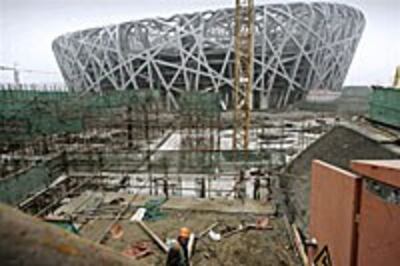
A crackdown by China’s new “energy-saving police” will do little to control power use and pollution during next year’s Beijing Olympics, experts say.
The city has started patrolling air-conditioned buildings including hotels, offices, and malls with a force of "energy cops" to check that thermostats aren't set too low, the Beijing News reported June 11.
The corps of 22 inspectors is the latest weapon in China’s war against energy waste and environmental damage. The government has set ambitious targets to cut major pollutants by 10 percent and raise energy efficiency by 20 percent under its Five-Year Plan ending in 2010.
Air conditioning is a major cause of pollution because coal-fired power generation is the country’s biggest pollution source. According to a 2006 study by the Paris-based International Energy Agency (IEA), coal accounts for nearly 74 percent of China’s power production.
You’ve got 22 people who are trying to control air conditioning in this huge capital city. What impact are they going to have?
“The power sector is the country’s largest polluter,” the IEA said.
‘Not enforceable’
In interviews with Radio Free Asia, experts voiced doubts that China’s new energy police would have a significant effect.
Robert Ebel, chairman of the energy program at the Washington-based Center for Strategic and International Studies, called the effort “not enforceable.”
“You’ve got 22 people who are trying to control air conditioning in this huge capital city,” Ebel said. “What impact are they going to have?”
“They come into a building and say, ‘Okay, it’s too cool in here. You’ve got to warm it up a bit.’ And they say, ‘Okay.’ They adjust the thermostat up and the inspector leaves, and they go back and drop it back down to where it was. So, unless the building inspector stays right there, it’s not going to have much of an impact.”
Ebel said the campaign will likely prove ineffective unless China’s government introduces long-delayed pricing reforms. Sharply higher costs for excessive electricity use would create a greater incentive for energy savings, but rate increases so far have been relatively small.
Failed inspections
Daniela Salaverry, co-director of the China program at Pacific Environment, a San Francisco-based nongovernmental organization, said similar inspections have failed to prevent coal-fired power plants in China from turning off anti-pollution devices, known as scrubbers.
“When the government officials are coming through, or when the regulators are coming through, everything looks great. But after they leave, they turn off the scrubbers,” Salaverry said.
Salaverry agreed that pricing reform to discourage wasteful energy use is the only way to get the problem under control. “That’s really what’s going to be the driving force here, is if there’s a bottom-line incentive for people to change energy policy and change energy consumption.”
Original reporting by Michael Lelyveld. Edited for the Web by Richard Finney.
